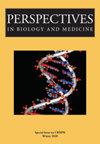儿童贫困问题
IF 0.7
4区 医学
Q2 HISTORY & PHILOSOPHY OF SCIENCE
引用次数: 0
摘要
在研究、政策和媒体中,减轻儿童贫困都是一个明确的焦点。儿童贫困被视为一个紧迫的社会问题,这在一定程度上反映了人们认识到早期生活环境对整个生命过程中健康的影响。然而,关注儿童贫困可能会产生意想不到的后果。首先,减轻儿童贫困的呼吁将儿童视为对未来人口健康的一项有价值的投资,而将成人贫困视为对稀缺资源的不当分配。其次,在谈论儿童贫困时,儿童被定位为无可指责的,而成年人则被视为生活在贫困中的潜在罪魁祸首。这忽略了早期贫困在整个生命历程中塑造机会的方式。这些说法是不一致的:如果童年的贫困影响了长期的结果,那么成年后的贫困就不可能是个人的失败。在社会投资和个人责任的基础上建立减轻贫困的理由,最终会支持而不是破坏巩固不平等的社会结构安排。认识到家庭和社区的相互联系以及贫穷在生命过程中每个阶段的破坏性,就有可能以一种只注重儿童贫穷永远无法实现的方式改善健康。本文章由计算机程序翻译,如有差异,请以英文原文为准。
The Trouble with Child Poverty
abstract: In research, in policy, and in the media, there is a clear focus on alleviating child poverty. Child poverty is cast as an urgent societal problem, in part reflecting recognition of the impact of early life circumstances on health across the life course. However, focusing on child poverty can have unintended consequences. First, calls to alleviate child poverty position children as a worthy investment in future population health, while adult poverty is represented as a misallocation of scarce resources. Second, children are positioned as blameless in talk about child poverty, whereas adults are viewed as potentially blameworthy for living in poverty. This ignores the ways early poverty shapes opportunities throughout the life course. These accounts are inconsistent: if a childhood of poverty shapes long-term outcomes, then poverty in adulthood cannot be an individual failing. Building arguments for poverty alleviation on social investment and personal responsibility ultimately supports rather than undermines the social structural arrangements that entrench inequalities. Recognizing the interconnectedness of families and communities and the destructiveness of poverty at every point in the life course has the potential to improve health in a way that can never be achieved by focusing solely on child poverty.
求助全文
通过发布文献求助,成功后即可免费获取论文全文。
去求助
来源期刊

Perspectives in Biology and Medicine
医学-科学史与科学哲学
CiteScore
1.40
自引率
20.00%
发文量
42
审稿时长
>12 weeks
期刊介绍:
Perspectives in Biology and Medicine, an interdisciplinary scholarly journal whose readers include biologists, physicians, students, and scholars, publishes essays that place important biological or medical subjects in broader scientific, social, or humanistic contexts. These essays span a wide range of subjects, from biomedical topics such as neurobiology, genetics, and evolution, to topics in ethics, history, philosophy, and medical education and practice. The editors encourage an informal style that has literary merit and that preserves the warmth, excitement, and color of the biological and medical sciences.
 求助内容:
求助内容: 应助结果提醒方式:
应助结果提醒方式:


